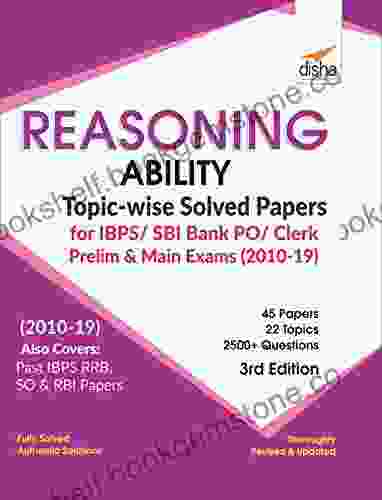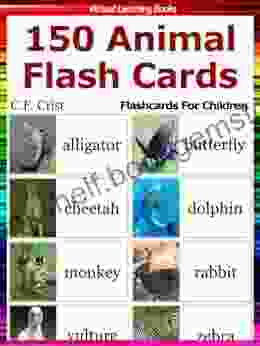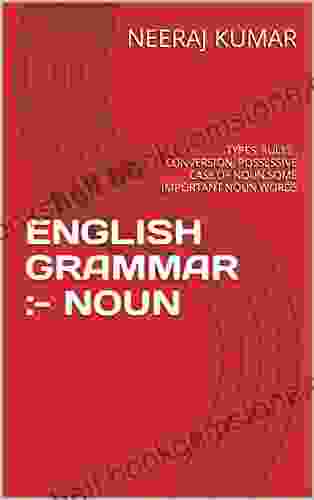Types, Rules, Conversion: Exploring the Possessive Case of Nouns

: Navigating the Intricate World of Nouns
In the vast tapestry of language, nouns stand tall as the workhorses of our communication, painting vivid pictures of people, places, things, and concepts. Among their many attributes, nouns possess a crucial grammatical feature known as the possessive case. This nuanced aspect of language allows us to express ownership and possession, adding depth and precision to our written and spoken words. In this comprehensive guide, we will embark on a journey to unravel the enigmatic world of possessive nouns, delving into their types, exploring their intricate rules, and mastering the art of their conversion.
Chapter 1: Unmasking the Types of Possessive Nouns
In the realm of possessive nouns, we encounter two primary categories:
4 out of 5
| Language | : | English |
| File size | : | 1394 KB |
| Text-to-Speech | : | Enabled |
| Screen Reader | : | Supported |
| Enhanced typesetting | : | Enabled |
| Print length | : | 15 pages |
| Lending | : | Enabled |
1.1 Possessive Adjectives
Possessive adjectives, acting as gatekeepers of ownership, modify nouns by indicating possession. They serve as convenient shortcuts, eliminating the need for lengthy phrases. Consider the example of "my book." Here, the possessive adjective "my" establishes the ownership of the book without resorting to the phrase "the book that belongs to me."
1.2 Possessive Nouns
Unlike their adjectival counterparts, possessive nouns take on a more direct approach. They are nouns that have undergone a transformation, taking on a possessive form to indicate ownership. The most common method of creating a possessive noun involves adding the suffix "-'s" to singular nouns and "-s'" to plural nouns that do not end in "-s." For instance, "the dog's bone" clearly conveys that the bone belongs to the dog. Similarly, "the students' backpacks" indicates ownership by a group of students.
Chapter 2: Unveiling the Rules Governing Possessive Nouns
To harness the power of possessive nouns effectively, it is essential to adhere to a set of grammatical rules. These rules provide the framework for expressing ownership with clarity and precision:
2.1 Rules for Forming Possessive Adjectives
Using possessive adjectives is relatively straightforward, requiring minimal effort in most cases. Simply add the suffix "-'s" to singular nouns and "-s'" to plural nouns that do not end in "-s." For instance, "his car" and "their hopes" are grammatically sound possessive adjective constructions.
2.2 Rules for Forming Possessive Nouns
The creation of possessive nouns follows a slightly more nuanced set of rules:
- For singular nouns, add the suffix "-'s." Examples: "the boy's bike," "the woman's purse"
- For plural nouns that end in "-s," simply add an apostrophe after the "s." Examples: "the students' assignments," "the cats' toys"
- For plural nouns that do not end in "-s," add the suffix "-'s." Examples: "children's books," "men's clothing"
Chapter 3: Mastering the Conversion from Common Nouns to Possessive Nouns
Transforming common nouns into their possessive forms is a skill that requires careful attention to detail. Here's a step-by-step guide:
3.1 Identifying the Type of Noun
The first step is to determine whether the noun in question is singular or plural. This distinction is crucial for applying the correct possessive form.
3.2 Applying the Appropriate Suffix
Depending on the type of noun, follow the rules outlined in Chapter 2 to add the correct possessive suffix. For singular nouns, use "-'s," and for plural nouns, use "-s'" (for nouns that do not end in "-s") or simply an apostrophe (for nouns that end in "-s").
3.3 Practicing Precision
To enhance your mastery, engage in ample practice. Write sentences that incorporate possessive nouns, paying meticulous attention to the correct formation and placement of the apostrophe.
Chapter 4: Embracing the Nuances of Possessive Nouns in Various Contexts
The possessive case of nouns finds application in a multitude of contexts, adding depth and specificity to our writing and speech. Some of the most common scenarios include:
4.1 Describing Ownership
Possessive nouns are indispensable for expressing ownership, clearly indicating to whom or what an object or concept belongs. Examples: "the teacher's desk," "the company's profits"
4.2 Indicating Relationships
Beyond material possessions, possessive nouns can also convey relationships between people, places, or things. Examples: "the father's son," "the city's mayor," "the book's author"
4.3 Expressing Time and Measurement
Possessive nouns extend their reach into the realms of time and measurement, enabling us to describe specific intervals or quantities. Examples: "a day's journey," "a month's salary," "a yard's distance"
Chapter 5: Exploring the Common Pitfalls and Exceptions in Possessive Noun Usage
Like all linguistic endeavors, the use of possessive nouns is not without its complexities and potential pitfalls. To avoid common errors, heed the following guidelines:
5.1 Watch out for Compound Nouns
When dealing with compound nouns (nouns made up of multiple words),always add the possessive suffix to the last word in the compound. Example: "the attorney general's decision"
5.2 Avoid Double Possessives
In most cases, using two possessive forms in succession is considered redundant and incorrect. Example: Instead of "the car's owner's name," use "the car owner's name."
5.3 Handle Proper Nouns with Care
Proper nouns (names of specific people, places, or things) generally do not require an additional possessive suffix. Instead, add "of the" before the noun. Example: "the President of the United States"
: Embracing the Power of Possessive Nouns
Our exploration of the possessive case of nouns has unveiled its transformative power in adding precision, depth, and ownership to our language. By understanding the types, rules, and conversion techniques associated with possessive nouns, we gain the linguistic tools to express ourselves with clarity and impact. Let us embrace the intricacies of possessive nouns and harness their potential to elevate our communication to new heights.
4 out of 5
| Language | : | English |
| File size | : | 1394 KB |
| Text-to-Speech | : | Enabled |
| Screen Reader | : | Supported |
| Enhanced typesetting | : | Enabled |
| Print length | : | 15 pages |
| Lending | : | Enabled |
Do you want to contribute by writing guest posts on this blog?
Please contact us and send us a resume of previous articles that you have written.
 Best Book
Best Book Page Flip
Page Flip Bookshelf
Bookshelf Literary loom
Literary loom Chapter
Chapter Bookish
Bookish PageTurner
PageTurner Bibliophile
Bibliophile Story
Story Inkwell
Inkwell Bookworm
Bookworm Labyrinth
Labyrinth Plot Twist
Plot Twist Prose
Prose Paperback
Paperback Storyteller
Storyteller Sanctuary
Sanctuary Fiction
Fiction Reading
Reading Chronicle
Chronicle Read
Read Leland Chant
Leland Chant Craig M Kershaw
Craig M Kershaw Amanda Barnes
Amanda Barnes John Mcphee
John Mcphee Templeton Peck
Templeton Peck Bruce Berglund
Bruce Berglund Darryl Hughes
Darryl Hughes Orson Scott Card
Orson Scott Card Daryl Balfour
Daryl Balfour Gill James
Gill James Bruno Grelon
Bruno Grelon Laura Dave
Laura Dave Stephanie Lewis
Stephanie Lewis Meghan Mccarthy
Meghan Mccarthy Boye Lafayette De Mente
Boye Lafayette De Mente James A Cashin
James A Cashin Ged Gillmore
Ged Gillmore Direct Hits
Direct Hits 8th Edition Kindle Edition
8th Edition Kindle Edition Joanna Kujawa
Joanna Kujawa Susan Straight
Susan Straight Jude Deveraux
Jude Deveraux Culture Smart
Culture Smart Book Worm Publishing
Book Worm Publishing Ari Mennander
Ari Mennander Jason E Portnof
Jason E Portnof Bruce Heyman
Bruce Heyman Charles Dickens
Charles Dickens William Pitts
William Pitts Nick Jans
Nick Jans 1st Edition Kindle Edition
1st Edition Kindle Edition Julian Mcdougall
Julian Mcdougall Charles A Wells
Charles A Wells Sybille Bedford
Sybille Bedford Maria Elena Alonso Sierra
Maria Elena Alonso Sierra Michael V Uschan
Michael V Uschan Martin Sternstein
Martin Sternstein Bruce Boudreau
Bruce Boudreau Tara Baukus Mello
Tara Baukus Mello Thomas Booth
Thomas Booth William Friar
William Friar Devaki Lakshmi
Devaki Lakshmi College Hippo
College Hippo David Morris
David Morris Nelson Demille
Nelson Demille Nanette Witmer
Nanette Witmer Beth Bartolini Salimbeni
Beth Bartolini Salimbeni Gregory Maassen
Gregory Maassen Richard Sattora
Richard Sattora Rebecca Kaye
Rebecca Kaye Lois Pryce
Lois Pryce Hokulani K Aikau
Hokulani K Aikau Tiara R Brown
Tiara R Brown John Otis
John Otis American Math Academy
American Math Academy Leslie Thomas
Leslie Thomas Sunny Lockwood
Sunny Lockwood Sergio Rassu
Sergio Rassu Cristen Hemingway Jaynes
Cristen Hemingway Jaynes Brien Foerster
Brien Foerster Pamela Bartley
Pamela Bartley Chris Moss
Chris Moss Ben Wildavsky
Ben Wildavsky Anne Strathie
Anne Strathie Josh Tabor
Josh Tabor Trish Nicholson
Trish Nicholson Jeff Kolby
Jeff Kolby Levison Wood
Levison Wood Smart Edition
Smart Edition Naomi Hansen
Naomi Hansen Pico Iyer
Pico Iyer Sadeqa Johnson
Sadeqa Johnson Robert Louis Stevenson
Robert Louis Stevenson William Least Heat Moon
William Least Heat Moon Shirley J Shepherd
Shirley J Shepherd Joseph A Citro
Joseph A Citro Dmv Test Bank
Dmv Test Bank Johan Reinhard
Johan Reinhard Joeanna Rebello Fernandes
Joeanna Rebello Fernandes Agnieszka Latocha
Agnieszka Latocha Mark Greenside
Mark Greenside Tyler Omoth
Tyler Omoth Charles H Dyer
Charles H Dyer Jay Griffiths
Jay Griffiths Caryn Boddie
Caryn Boddie C F Carter
C F Carter Kenneth Cline
Kenneth Cline Barbara Fradkin
Barbara Fradkin Andy Fine
Andy Fine Bret Baier
Bret Baier Bobby Newman
Bobby Newman Original Edition Kindle Edition
Original Edition Kindle Edition Big Daddy Ozone
Big Daddy Ozone Hicham And Mohamed Ibnalkadi
Hicham And Mohamed Ibnalkadi Julie Tagg
Julie Tagg Rick Steves
Rick Steves Scott Graham
Scott Graham Frank Ayres
Frank Ayres Jon A Archambault
Jon A Archambault Businessnews Publishing
Businessnews Publishing Printright
Printright Tao Le
Tao Le Dr Hooelz
Dr Hooelz Bryan Ethier
Bryan Ethier Jeri Magg
Jeri Magg Lance Pototschnik
Lance Pototschnik Neal Patterson
Neal Patterson Stephen Haddelsey
Stephen Haddelsey Eunice Lewis Ph D
Eunice Lewis Ph D Mark Donnelly
Mark Donnelly Doretta Groenendyk
Doretta Groenendyk Robert A Johnson
Robert A Johnson Georgios Papadakis
Georgios Papadakis Alex Kava
Alex Kava R K Agarwal
R K Agarwal David Mcilroy
David Mcilroy Dojolab Inc
Dojolab Inc Geraldine Woods
Geraldine Woods T I Lowe
T I Lowe Dk Eyewitness
Dk Eyewitness Blake Banner
Blake Banner Kristin Hannah
Kristin Hannah Penelope Douglas
Penelope Douglas Pamela And Fred Peters
Pamela And Fred Peters Marcia Desanctis
Marcia Desanctis Alexandria House
Alexandria House Tracy Brown Collins
Tracy Brown Collins Lori Evert
Lori Evert Osasumwen Asoro
Osasumwen Asoro Jon C Stott
Jon C Stott Gideon Labiner
Gideon Labiner Laurie Frankel
Laurie Frankel Jose M Forero Bautista
Jose M Forero Bautista Arianna Astuni
Arianna Astuni Mary Ann Hogan
Mary Ann Hogan Dennis Stemmle
Dennis Stemmle Alice Morse Earle
Alice Morse Earle Rashaun Johnson
Rashaun Johnson Leckie
Leckie Terry Palechuk
Terry Palechuk Kyoan
Kyoan Kevin Milton
Kevin Milton Jeanne St James
Jeanne St James Tommy Xiao Wan
Tommy Xiao Wan Jerry A Pattengale
Jerry A Pattengale Brian Clegg
Brian Clegg Ted Dorsey
Ted Dorsey Julie Argyle
Julie Argyle J A Johnstone
J A Johnstone Nicky Pellegrino
Nicky Pellegrino Cyprian Mendonca
Cyprian Mendonca Jeffrey Brautigam
Jeffrey Brautigam Terrance Zepke
Terrance Zepke Steven Schneider
Steven Schneider Peter Liljedahl
Peter Liljedahl Griselda Sprigg
Griselda Sprigg David Baldacci
David Baldacci Curving Earth Publishing
Curving Earth Publishing Marty Ofonagoro
Marty Ofonagoro Heather E Schwartz
Heather E Schwartz Scott Colby
Scott Colby Donnie Smith
Donnie Smith Tracy Owens
Tracy Owens James D Giovannini
James D Giovannini Lisa Kleypas
Lisa Kleypas Julia Ann Clayton
Julia Ann Clayton Schoolhouse Heaven
Schoolhouse Heaven Jennifer Steil
Jennifer Steil Graham Mackintosh
Graham Mackintosh Wilfred Cude
Wilfred Cude Bill Ingersoll
Bill Ingersoll Jason Hogan
Jason Hogan James Patterson
James Patterson Bob Reiss
Bob Reiss Robert Crais
Robert Crais Nat Brown
Nat Brown James Grant Peterkin
James Grant Peterkin Disha Experts
Disha Experts Eric Seale
Eric Seale Vicki Hearne
Vicki Hearne Tom Palmer
Tom Palmer Nilakantasrinivasan J Neil
Nilakantasrinivasan J Neil Bryan Nelson
Bryan Nelson Lawrence W Tuller
Lawrence W Tuller Jon B Barry
Jon B Barry Sacha Black
Sacha Black Arthur Miller
Arthur Miller Texes Exam Secrets Test Prep Team
Texes Exam Secrets Test Prep Team Thant Myint U
Thant Myint U Russ Howard
Russ Howard Brandon Stanton
Brandon Stanton Anne E Brevig
Anne E Brevig Nancy Roe Pimm
Nancy Roe Pimm Bruce Rosenfeld
Bruce Rosenfeld Tia Williams
Tia Williams Daniel Putkowski
Daniel Putkowski William Mckeen
William Mckeen Nicholas Gagnier
Nicholas Gagnier Maoz Azaryahu
Maoz Azaryahu C Michael Hiam
C Michael Hiam Richard Bronson
Richard Bronson Corine Gantz
Corine Gantz Illustrated Edition Kindle Edition
Illustrated Edition Kindle Edition Kathleen Kirkland
Kathleen Kirkland Tina Cho
Tina Cho Pati Jinich
Pati Jinich Joseph Toone
Joseph Toone Chuck Gormley
Chuck Gormley Roderick J Fraser Jr
Roderick J Fraser Jr Lonely Planet
Lonely Planet Greg Jacobs
Greg Jacobs Steven Rothfeld
Steven Rothfeld Maha Alkurdi
Maha Alkurdi James Good
James Good Roald Amundsen
Roald Amundsen Audiolearn Content Team
Audiolearn Content Team Maya Benami
Maya Benami Kevin Griffith
Kevin Griffith Lsatmax Lsat Prep
Lsatmax Lsat Prep Rod Nordland
Rod Nordland Ed Willes
Ed Willes Noor Ain
Noor Ain Doug Hall
Doug Hall April Vahle Hamel
April Vahle Hamel James Rollins
James Rollins Susan Davis Becker
Susan Davis Becker Mike Sonnenberg
Mike Sonnenberg Eric Simons
Eric Simons John Hersey
John Hersey Deborah Miller
Deborah Miller Thaddeus Hatter
Thaddeus Hatter Ben Egginton
Ben Egginton Elke Gschossmann Hendershot
Elke Gschossmann Hendershot Wayne Stewart
Wayne Stewart Mitt Romney
Mitt Romney Cathy Jackson
Cathy Jackson Gary Robert Muschla
Gary Robert Muschla Brian Andrews
Brian Andrews Mario Rizzi
Mario Rizzi Michael R Lindeburg
Michael R Lindeburg Gerry Lekas
Gerry Lekas Lee Jamison
Lee Jamison Judy Lipson
Judy Lipson Barry Eisler
Barry Eisler Angelo Tropea
Angelo Tropea R M Patterson
R M Patterson John R Morgan
John R Morgan Paul Watson
Paul Watson Lori Schumacher
Lori Schumacher Debbie S Miller
Debbie S Miller Bobby Orr
Bobby Orr Clifford D Stark
Clifford D Stark Erica Abbett
Erica Abbett N K Jemisin
N K Jemisin Wendy C Crone
Wendy C Crone William Beebe
William Beebe Paul Oliver
Paul Oliver Sean Dooley
Sean Dooley Joshua Obanijesu
Joshua Obanijesu Anselme Baud
Anselme Baud Joseph Mctaggart
Joseph Mctaggart Sharon Asher
Sharon Asher Atul Kalhan
Atul Kalhan Judy Tilton Brunner
Judy Tilton Brunner Balazs Csigi
Balazs Csigi Kingsley Augustine
Kingsley Augustine Linda Anne Silvestri
Linda Anne Silvestri Barbara Krumhardt
Barbara Krumhardt Shannon Dittemore
Shannon Dittemore Barbara A Lynch Johnt
Barbara A Lynch Johnt The Total Travel Guide Company
The Total Travel Guide Company Robert Caprio
Robert Caprio Brad Dude
Brad Dude Kavitha M
Kavitha M Ken Horlor
Ken Horlor Beau Riffenburgh
Beau Riffenburgh Vincent Chidindu Asogwa
Vincent Chidindu Asogwa Natalya Androsova
Natalya Androsova Erfun Geula
Erfun Geula Vernon G Zunker
Vernon G Zunker Baby Professor
Baby Professor Brian Leaf
Brian Leaf Dawn Adlam
Dawn Adlam Reinaldo Arenas
Reinaldo Arenas E C Murray
E C Murray Marek Sobski
Marek Sobski Brad Olsen
Brad Olsen Clay Boutwell
Clay Boutwell I C Robledo
I C Robledo Mary Jo Mcconahay
Mary Jo Mcconahay Mathivanan Palraj
Mathivanan Palraj James Teitelbaum
James Teitelbaum 4th Edition Kindle Edition
4th Edition Kindle Edition Paul Noble
Paul Noble Nishant Jindal
Nishant Jindal Simon Winchester
Simon Winchester R Bruce Richardson
R Bruce Richardson Barry Broadfoot
Barry Broadfoot Walter Dare
Walter Dare Suzanne Reece
Suzanne Reece Tara Kangarlou
Tara Kangarlou Tim Wharnsby
Tim Wharnsby Chantel Acevedo
Chantel Acevedo Bruce Spydar
Bruce Spydar Indy Quillen
Indy Quillen Nicholas Hirshon
Nicholas Hirshon Rets Griffith
Rets Griffith Eli Wilson
Eli Wilson Michael Lieberman
Michael Lieberman Lizabeth Hardman
Lizabeth Hardman Luisa Gastambide
Luisa Gastambide My Daily Russian
My Daily Russian Kelli Lawrence
Kelli Lawrence Stephen Hui
Stephen Hui Benjamin Smith
Benjamin Smith Genius Reads
Genius Reads Tony Burton
Tony Burton Intelligent
Intelligent Borja Loma Barrie
Borja Loma Barrie Bob Duff
Bob Duff Tanmay Mehta
Tanmay Mehta Ryan Murdock
Ryan Murdock Jan Tristan Gaspi
Jan Tristan Gaspi Susan Meissner
Susan Meissner Lucas Burns
Lucas Burns Anton Chekhov
Anton Chekhov Tim Brown
Tim Brown Manfred Theisen
Manfred Theisen Elizabeth Gardner
Elizabeth Gardner Brian Reddington
Brian Reddington Alina Adams
Alina Adams Wilfred M Mcclay
Wilfred M Mcclay Annabel Chase
Annabel Chase David Faulkner
David Faulkner Janet Beissinger
Janet Beissinger Karen George
Karen George Shannon Ables
Shannon Ables Nirosha Ruwan
Nirosha Ruwan Rosemarie Allen
Rosemarie Allen Carrie Winstanley
Carrie Winstanley Egon Erwin Kisch
Egon Erwin Kisch W Michael Kelley
W Michael Kelley Nathan Halberstadt
Nathan Halberstadt Russell Clark
Russell Clark Johnny Quinn
Johnny Quinn Gray Malin
Gray Malin Mark Zegarelli
Mark Zegarelli Bonnie Bley
Bonnie Bley Sarah Smierciak
Sarah Smierciak Wolfedale Press
Wolfedale Press Taras Grescoe
Taras Grescoe William W Johnstone
William W Johnstone Ed Stafford
Ed Stafford Burt L Standish
Burt L Standish Marcia Langton
Marcia Langton Glenn Rivers
Glenn Rivers Lisa Pietsch
Lisa Pietsch Dr John T Whiting
Dr John T Whiting Annika Hernroth Rothstein
Annika Hernroth Rothstein Sally Poncet
Sally Poncet Michel Roy
Michel Roy Chris Santella
Chris Santella Gerald Durrell
Gerald Durrell Bob Smale
Bob Smale Steve Sorensen
Steve Sorensen Bruce Barcott
Bruce Barcott Karen O Toole
Karen O Toole Darcy Gaechter
Darcy Gaechter Pierluigi Spagnolo
Pierluigi Spagnolo Devin Carroll
Devin Carroll Ashley Schmitt
Ashley Schmitt Bob Goddard
Bob Goddard James A Michener
James A Michener Alison Mcghee
Alison Mcghee Brett Edward Whalen
Brett Edward Whalen Ingo Berensmeyer
Ingo Berensmeyer Gebshu Kukhet
Gebshu Kukhet Lori Haskins Houran
Lori Haskins Houran Lynda Jones
Lynda Jones Jay Greeson
Jay Greeson Innovative Language Learning
Innovative Language Learning Greg Wyshynski
Greg Wyshynski Jess Tiffany
Jess Tiffany Gregory J Privitera
Gregory J Privitera Hans Staden
Hans Staden Damion Hunter
Damion Hunter Janisse Ray
Janisse Ray Matt Kalman
Matt Kalman Rajani Katta
Rajani Katta Test Masters
Test Masters Quick Reads
Quick Reads Karen Hill Anton
Karen Hill Anton Paul Deepan
Paul Deepan Jonathan A Levi
Jonathan A Levi Michael Vlessides
Michael Vlessides Suzanne Brickman
Suzanne Brickman Mandee Heller Adler
Mandee Heller Adler David Churchman
David Churchman Dinesh Kumar Goyal
Dinesh Kumar Goyal Steve Hely
Steve Hely Elijah N Daniel
Elijah N Daniel Paul Volponi
Paul Volponi Ginger Sinsabaugh
Ginger Sinsabaugh John Gregory Smith
John Gregory Smith Dr John Hockey
Dr John Hockey Ben Buckton
Ben Buckton Peter Nichols
Peter Nichols Steve Sonntag
Steve Sonntag Brian Kent
Brian Kent Gwenda Cornell
Gwenda Cornell Yuki Mano
Yuki Mano Paddy Mcqueen
Paddy Mcqueen Tristan Jones
Tristan Jones Phyllis Folb
Phyllis Folb Janet E Wall
Janet E Wall Simon Bird
Simon Bird Marty Gitlin
Marty Gitlin Brandon Royal
Brandon Royal Kayla Chalko
Kayla Chalko Don L Gates
Don L Gates Stephen Tarsitano
Stephen Tarsitano Dan Myers
Dan Myers John Biggam
John Biggam S K Gupta
S K Gupta Blair Braverman
Blair Braverman Raja Shehadeh
Raja Shehadeh Simon Gervais
Simon Gervais William Cowper Prime
William Cowper Prime George J Hademenos
George J Hademenos Jim Harrison
Jim Harrison Blether Travel Guides
Blether Travel Guides Freya Stark
Freya Stark Print Replica Kindle Edition
Print Replica Kindle Edition Brandon Sanderson
Brandon Sanderson Dan Fullerton
Dan Fullerton Wendy Francis
Wendy Francis Nikki Kazimova
Nikki Kazimova Peter Barber
Peter Barber Shawn Inmon
Shawn Inmon John Morrison
John Morrison Robin Hobb
Robin Hobb Russell Blake
Russell Blake Bill Streever
Bill Streever Rodney Paul
Rodney Paul Shannon Enete
Shannon Enete H M Conroy
H M Conroy Jackson Carter
Jackson Carter Clair Lasater
Clair Lasater Jason Zemcik
Jason Zemcik Rafael Ocasio
Rafael Ocasio Martin J Pring
Martin J Pring Key Notes
Key Notes Nahee Park
Nahee Park Daniel Mode
Daniel Mode Nick Adams
Nick Adams Thad Vogler
Thad Vogler Arden Rembert Brink
Arden Rembert Brink Scott Coplan
Scott Coplan Pass Your Class
Pass Your Class Lisa Mcclendon Sims
Lisa Mcclendon Sims Emma Sue Prince
Emma Sue Prince Omni Reads
Omni Reads Rebecca Westrup
Rebecca Westrup C F Crist
C F Crist Brent J Burrows Ii
Brent J Burrows Ii Michael Tefula
Michael Tefula Study Guide Edition Kindle Edition
Study Guide Edition Kindle Edition Deanne Howell
Deanne Howell Lauren Lucien
Lauren Lucien Christina Pawlowski
Christina Pawlowski Lila Z Rose
Lila Z Rose David L Golemon
David L Golemon Christie Sausa
Christie Sausa John Hodgman
John Hodgman Vincent Min
Vincent Min John Gilstrap
John Gilstrap Rick Townsend
Rick Townsend Marie Cirano
Marie Cirano Miles Martin
Miles Martin Daniel Farcas
Daniel Farcas David Newton
David Newton Barbara Allan
Barbara Allan Kay Walten
Kay Walten Gabriel J Connor
Gabriel J Connor Craig Medico
Craig Medico C Rich
C Rich Brad Anderson
Brad Anderson Kim Heinbuch
Kim Heinbuch Sarah Vowell
Sarah Vowell Anthony J Bennett
Anthony J Bennett Sigurd F Olson
Sigurd F Olson Daily Language Learning
Daily Language Learning Susan Jane Gilman
Susan Jane Gilman Jane Bottomley
Jane Bottomley Michael Egan
Michael Egan Ben Cook
Ben Cook Pam Coburn
Pam Coburn Viki Winterton
Viki Winterton Gail Fay
Gail Fay Sandra Cain
Sandra Cain Diane Lindsey Reeves
Diane Lindsey Reeves Hugh Henderson
Hugh Henderson Jack Donnelly
Jack Donnelly John Muir
John Muir Les Weatheritt
Les Weatheritt Marie Herbert
Marie Herbert Frances Mayes
Frances Mayes Sam Quek
Sam Quek Katherine Dunham
Katherine Dunham Jacob Brezinski
Jacob Brezinski Beryl Ratzer
Beryl Ratzer Korrel Kanoy
Korrel Kanoy Stephanie Saldana
Stephanie Saldana Katie Malachuk
Katie Malachuk Bob Mckenzie
Bob Mckenzie Matt Rendell
Matt Rendell Approach Guides
Approach Guides Barzin Pakandam
Barzin Pakandam Cathy A Malchiodi
Cathy A Malchiodi Ruth Garner
Ruth Garner Anna Curran
Anna Curran Er Sunil Batra
Er Sunil Batra Kindle Edition
Kindle Edition Barbara Mould Young
Barbara Mould Young Louise Heal Kawai
Louise Heal Kawai Kim Dinan
Kim Dinan Sylvain Tesson
Sylvain Tesson Peter Ballin
Peter Ballin Kate Maloy
Kate Maloy Haim Watzman
Haim Watzman Nic Oatridge
Nic Oatridge Robert Andrew Powell
Robert Andrew Powell Paul Cobley
Paul Cobley Sumoreads
Sumoreads Sue Tyson Ward
Sue Tyson Ward Pat Guy
Pat Guy Christine A Smyczynski
Christine A Smyczynski Peterson S
Peterson S Peter Mcdougall
Peter Mcdougall Seymour Resnick
Seymour Resnick Roberta Raigh Pryor
Roberta Raigh Pryor Chris Fagan
Chris Fagan Janine Robinson
Janine Robinson Paul Blanchard
Paul Blanchard Ruth Everhart
Ruth Everhart Zigzag English
Zigzag English Jamie Pedrazzoli
Jamie Pedrazzoli Magi Nams
Magi Nams Pamela K Lamb
Pamela K Lamb Nick Kypreos
Nick Kypreos Nicole Chung
Nicole Chung Ryszard Kapuscinski
Ryszard Kapuscinski Oliver Bullough
Oliver Bullough Robert Whiting
Robert Whiting Stephen J Pyne
Stephen J Pyne Christine Wiebe
Christine Wiebe Jose Antonio Vargas
Jose Antonio Vargas Funso Aiyejina
Funso Aiyejina Asrai Devin
Asrai Devin Ronald A Reis
Ronald A Reis Sara Dawn Johnson
Sara Dawn Johnson Stephen Graham
Stephen Graham Go Books
Go Books Janet Evans
Janet Evans Richard Connor
Richard Connor Tim Severin
Tim Severin Joe Abercrombie
Joe Abercrombie
Light bulbAdvertise smarter! Our strategic ad space ensures maximum exposure. Reserve your spot today!

 Isaac MitchellAruba, Bonaire, and Curacao: Unforgettable Pocket Adventures in the Caribbean
Isaac MitchellAruba, Bonaire, and Curacao: Unforgettable Pocket Adventures in the Caribbean
 Joel MitchellFTCE Reading 12 Flashcard Study System: A Comprehensive Guide to Passing the...
Joel MitchellFTCE Reading 12 Flashcard Study System: A Comprehensive Guide to Passing the... Milton BellFollow ·17.2k
Milton BellFollow ·17.2k Devin CoxFollow ·2.8k
Devin CoxFollow ·2.8k Gilbert CoxFollow ·14.6k
Gilbert CoxFollow ·14.6k Gustavo CoxFollow ·10.8k
Gustavo CoxFollow ·10.8k Colin RichardsonFollow ·13.1k
Colin RichardsonFollow ·13.1k Rodney ParkerFollow ·11.3k
Rodney ParkerFollow ·11.3k Brian WestFollow ·18.8k
Brian WestFollow ·18.8k Isaac BellFollow ·17.3k
Isaac BellFollow ·17.3k

 Douglas Powell
Douglas PowellPreparation and Support for Teacher Assessment: Leckie...
Teacher assessment is an important part of...

 Derek Bell
Derek BellMaster the Basics of Japanese Grammar: A Comprehensive...
Embarking on your journey to master the...

 Edison Mitchell
Edison MitchellReasoning Ability Topic Wise Solved Papers For IBPS SBI...
The Reasoning...

 F. Scott Fitzgerald
F. Scott FitzgeraldA New Survey of the West Indies, 1648: Broadway...
Published in...

 Cooper Bell
Cooper BellPeekaboo Baby Toddler: 150 Animal Flash Cards for...
Are you ready to embark on...
4 out of 5
| Language | : | English |
| File size | : | 1394 KB |
| Text-to-Speech | : | Enabled |
| Screen Reader | : | Supported |
| Enhanced typesetting | : | Enabled |
| Print length | : | 15 pages |
| Lending | : | Enabled |










